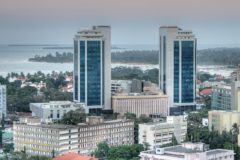
First published 8 October 2023
With the inclusion of venture debt, venture inflows to Africa totalled $6.5 billion across 853 deals – but Somalia did not get any of this share.
In a skeletally vibrant African tech ecosystem, the spotlight often shines on well-established hubs in West Africa, such as Nigeria, and in the southern regions, like South Africa. Kenya, Rwanda, and Ethiopia have garnered attention for their growing tech ecosystems. Yet, amid these developments, quiet underdogs exist, such as Somalia. While discussions of fundraising rounds typically bypass the country, its growing potential within its borders should not be ignored. The tech scene in Somalia might be small on the global stage today, but a transformational foundation has been set up based on activities that have been taking place there. With increased visibility and venture capital interest, it could start making a name for itself.

Join us for TechCabal Battlefield, Moonshot’s startup competition where you can showcase your startup idea to a global audience and an esteemed panel of judges and stand a chance to win up to 2.5 million naira in funding for your business!
Click to register for TC BattlefieldSomalia’s geographical location makes it an attractive space for investment
Somalia is geographically based in the Horn of Africa and has over 18 million people. It has a strategic coastal location adjacent to some of the world’s busiest maritime routes, and its proximity to the Middle East and South Asia makes it an attractive prospect for global enterprises seeking expansion opportunities.
After the stabilisation of the nation following the 2012 polls, Somalia has attempted to work towards rebuilding itself as a regional hub for commerce, transportation, trade, and industry. Several factors have facilitated this development, including the rising adoption of digital technologies, rapid urbanisation, and planned investments in critical sectors such as energy, ports, education, and healthcare. The World Bank supports the nation’s commitment to instituting reforms and re-engaging with the region, which can open channels for human capital rejuvenation and overall economic growth.
Per a Somalia startup ecosystem report, there is synergy between the public sector and local entrepreneurs that has given rise to innovations addressing the nation’s most pressing issues. This has jumpstarted the nation’s startup ecosystem, marking Somalia’s potential for growth. For instance, investments have been directed towards renewable energy, with Somalia’s vast resource potential positioning it as a leading contender for onshore wind power generation in Africa, capable of producing 30,000 to 45,000 MW. The emergence of the Service as a Service (SAAS) sector has also supported its startup landscape that cuts across transportation, food, healthcare, and education.
However, given these numbers and the potential in Somalia, why don’t we hear about a lot of startup activity in the country, and is there a way to address this?
Article continues after this ad
A look into the tech players in Somalia
Somalia has a growing startup space with key startups in many industries, including healthcare, logistics, renewable energy, mobile money, and communication. For instance, OGOW provides electronic medical records and practice management systems for hospitals and clinics, helping them to boost patient care. Gulivery is a third-party delivery service that helps businesses focus on their services by handling the delivery logistics. SECCCO provides clean, low-cost, and sustainable renewable energy solutions, improving the lives of thousands of Somalis. SolarGen is a renewable energy and water solution provider that focuses on distributing solar products and the engineering, procurement, and construction of world-class projects. SoPay is an all-in-one mobile money solution that allows users to transfer money, pay utility bills, make online payments, and request money. WAAFI is an app that combines mobile money, communication, and productivity. SIMAD iLab is a place where people can learn about and start new businesses—and recently, it launched an innovation theatre, a space for startups and MSMEs, and a corner for private-sector leaders and civil servants.
Other players, too, such as accelerators and boot camps, want to make a mark in the tech ecosystem in Somalia. Fikrcamp, for instance, teaches young people how to code in native languages such as Somali and has even expanded to Ethiopia with the same goals. SOMINVEST seeks to attract foreign investment and improve investment policies. The Women Business Accelerator Program offers training and funding for female-owned startups. The Somali Technology Association Centre, established in 2018, offers tech training services. HarHub Business Incubation supports early-stage startups with entrepreneurship training and incubation services. iRise is an innovation hub in Mogadishu offering workspaces and office spaces for startups. The IITE Institute incubator assists SIMAD University students with mentorship and resources.
Partner Content:
Meet DockHive: A marriage between docker and blockchain technology
Admittedly, Somalia has been plagued by political instability and conflict for decades, which has hindered the development of a robust tech ecosystem, so its presence in the African tech ecosystem has been muted.
With massive VC investment in Africa, Somalia is yet to spark interest
According to the African Private Capital Association, by deal volume, 2022 was a record year for venture capital investment in Africa. Although the total amount of capital invested in African startups dropped slightly in 2022, it remained stable compared to the record set in 2021. With the inclusion of venture debt, venture inflows to Africa totalled $6.5 billion across 853 deals.
West Africa remained the top region for venture capital investment in Africa, with Nigeria as the most active country per volume at 22%. Despite these developments in African venture capital, Somalia received no investments or mentions in the African Private Capital Association report.
Can something be done about this disinterest in Somalia?
To make Somalia more attractive to venture capital (VC) investments, several key steps should be taken. While the government is prioritising political stability and establishing a conducive regulatory environment that protects investors’ rights and encourages entrepreneurship, other changes could be made, such as improving infrastructure, access to education, and digital connectivity to create a favourable ecosystem for startups. Building a vibrant tech and innovation ecosystem, fostering local talent, and offering tax incentives for VC investments can further attract capital, and showcasing success stories can help boost Somalia’s appeal to VC investors looking for emerging market opportunities.
These suggestions are not straightforward nor the easiest to execute. Still, they mark an essential stepping stone for Somalia to make its tech ecosystem more vibrant and visible to potential VCs, or any other organisations that may want to invest in the country.
Kenn Abuya,
Senior Reporter, TechCabal.
We’d love to hear from you
Psst! Down here!
Thanks for reading today’s Next Wave. Please share. Or subscribe if someone shared it to you here for free to get fresh perspectives on the progress of digital innovation in Africa every Sunday.
As always feel free to email a reply or response to this essay. I enjoy reading those emails a lot.
TC Daily newsletter is out daily (Mon – Fri) brief of all the technology and business stories you need to know. Get it in your inbox each weekday at 7 AM (WAT).
Follow TechCabal on Twitter, Instagram, Facebook, and LinkedIn to stay engaged in our real-time conversations on tech and innovation in Africa.






























